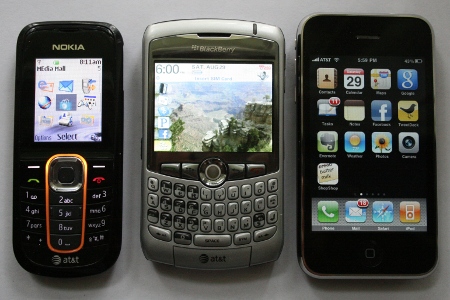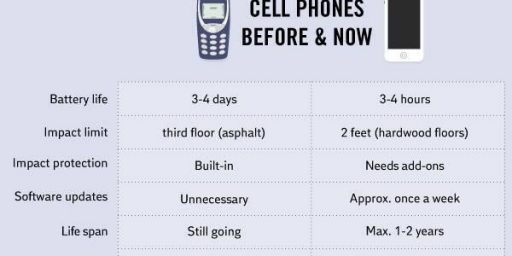The Problem of Generalizing from Specific Cases (Cell Phones and Driving Edition)
Proving yet again that the plural of anecdote is not data.
 We have all, no doubt, seen the story about 19-year-old who caused an accident in Missouri whilst texting and driving: Driver sent or got 11 texts in 11 min before crash
We have all, no doubt, seen the story about 19-year-old who caused an accident in Missouri whilst texting and driving: Driver sent or got 11 texts in 11 min before crash
A 19-year-old pickup truck driver involved in a deadly highway pileup in Missouri last year sent or received 11 texts in the 11 minutes immediately before the accident, federal investigators said Tuesday.
The driver sent six texts and received five texts, with the last text just before his pickup traveling at 55 mph crashed into the back of a tractor truck, beginning a chain collision. The pickup was rear-ended by a school bus, which in turn was rammed by a second school bus.
The pickup driver and a 15-year-old student on one of the school buses were killed. Thirty-eight other people were injured in the Aug. 5, 2010, accident near Gray Summit, Mo.
Stories of this nature has lead to the following (via CNN): NTSB recommends full ban on use of cell phones while driving
A federal safety board called Tuesday for a nationwide ban on the use of cell phones and text messaging devices while driving.
The recommendation is the most far-reaching yet by the National Transportation Safety Board, which in the past 10 years has increasingly sought to limit the use of portable electronic devices — recommending bans for novice drivers, school bus drivers and commercial truckers. Tuesday’s recommendation, if adopted by states, would outlaw non-emergency phone calls and texting by operators of every vehicle on the road.
It would apply to hands-free as well as hand-held devices, but devices installed in the vehicle by the manufacturer would be allowed, the NTSB said.
Now, I can understand the impulse to ban hand-held devices, although the notion of banning hands-free devices strikes me as harsh. We have all, no doubt, witnessed people having a hard time driving and talking on the phone.
An NPR story notes the following, however:
Russ Rader, a spokesman for the Insurance Institute for Highway Safety, agrees but says there’s just one problem: “We don’t know if [the demonstration project] had any effect on crashes — and that’s a key measure.”
The institute’s own study shows that states with cellphone bans have seen no real decrease in accident rates.
“The curious thing is that even as cellphone use has increased exponentially by drivers in vehicles, we see no surge in crashes,” Rader says. “So as this trend has accelerated, with more and more people having phones in their cars and using them, the number of overall crashes has been declining.”
Cellphone use behind the wheel is no doubt a dangerous distraction, Rader says. But the overall problem of distracted driving is much bigger — it’s about fiddling with the car radio or eating a sandwich as much as it is cellphones, he says.
Somehow I doubt we are going to ban sandwiches or radios in cars (or, for that matter, other distractions like, say, my kids in the backseat).
The interesting thing is above to me is not that states will cell phone bans have not seen a decrease in accident rates (as one assumes that many people ignore the law—indeed, the Missouri teen noted above was in violation of the law at the time of his accident). What is more telling is that if cell phones were, in fact, uniquely dangerous we should have seen a substantial increase in accident rates nationally over the last decade. If we have not, then the notion that cell phones are a special menace is unfounded.
Indeed, to that point (and to return to the first story linked above):
At any given moment last year on America’s streets and highways, nearly 1 in every 100 car drivers was texting, emailing, surfing the Web or otherwise using a handheld electronic device, the safety administration said. And those activities spiked 50 percent over the previous year.
Now, don’t get me wrong: this sounds like a really, really bad idea. However, if the behavior is this prevalent, and yet accident rates are down, where is the justification for a blanket ban?
Further, getting back to the alleged emblematic case:
Driver distraction wasn’t the only significant safety problem uncovered by NTSB’s investigation of the Missouri accident. Investigators said they believe the pickup driver was suffering from fatigue that may have eroded his judgment at the time of the accident. He had an average of about five and a half hours of sleep a night in the days leading up to the accident and had had fewer than five hours of sleep the night before the accident, they said.
This would seem to weaken the notion that the case should lead to a total phone ban, yes?
At any rate, it seems to me that if there is no evidence that cell phone use by drivers in general leads to increased accidents then a blanket ban is a wholly unwarranted curtail of reasonable freedom of action.






I’m in favor of banning kids in the back seat. I could get a much cooler car.
Professor Taylor, you have begun to sway me towards your side of the argument. Although it should be pointed out that there is at least one study that shows cell phone usage is as dangerous as drunk driving, and we ain’t legalizing that anytime soon.
@Franklin:
id love to see that study. link?
not being a jackass either. totally sincere.
I have noticed no decrease in cell phone use by other drivers since a ban was instituted where I live. I would say that it is because while electronic distractions have gone up it is still relatively small and those who are not doing it have been avoiding them.
Just recently I was nearly sideswiped by a guy in a truck who was drinking coffee with one hand and had a cellphone to his ear with the other. Since I was paying attention I didn’t get to be a statistic for you. Just a month ago I was almost hit by a guy in a Miata, driving with the top down, cellphone to one ear and fingers of other hand plugging his other ear. Once again because I was paying attention and saw him coming I was able to evade and not become a statistic.
Finally, how does one determine a cellphone related accident? In your example it was a big accident that was fully investigated, but if you rear end me and cause a few hundred dollars in damage they’re not going to go to the effort of pulling phone records to know that you didn’t just hang up your phone and pretend you weren’t on it (because the cellphone would have been illegal while being stupid is not). Unlike drugs and alcohol, cellphone use is not testable after the fact.
They have banned hand held cell phones in Washington and Oregon but they haven`t stopped them from doing it anyway. They do cause accidents and a-lot or near accidents. I guess they will have to get tougher as they did with DUII.
@James: Nearly getting hit is a weekly event for me down here. Just today I had a large truck try to merge into me while I was next to him.. Sadly most of the time there’s no electronic device included just plain stupid people driving stupid..
@CB: Just type “Cell-phone use as dangerous as drunk driving” into Google, though I suspect all that is available on Google are reports of the study, rather than the actual study.
A couple of related notes. A company is developing technology that will allow the Driver’s cell phone to be disabled, but not passengers..
Michigan has a ban on texting while driving, but the law is written such that if the car is not moving (i.e. stopped at a light) its still legal to text.
Why create a law that is sure to be flounted? There is good stuff in this article; I’m impressed.
@John Peabody: Right. Especially in the case of hands free devices. How can officers even tell someone in using their onstar phone or other hands free device. At best it could be used for establishing fault after a tragic accident.
@John Peabody:
Beyond the supposed safety issues — which ST has offered a great explanation for — these types of laws allow for an increase in police powers. Having a cellphone law on the books allows you to pull over suspicious people who are using a cellphone. And, if you buy into the idea that “if guns are banned, only criminals have guns” — there’s in theory a corollary with cellphones.
Enforcement is a nightmare. In theory, I’m supportive of a ban. There is no question in my mind that driving while using your phone (hands-free or not) impairs you significantly.
The hands-free thing is the problem, for me, with bans. I don’t think hands-free helps much. It’s not about hands, it’s about attention & focus. My wife only has 1 hand, and she drives fine ’cause she pays bloody attention to what she’s doing. You could have 10 hands and if you’re blathering away and not focusing, you can still cause an accident.
So, if you do a ban and you go all-out on enforcement, you probably end up ticketting a bunch of people who hold their phones up to their ears. Meanwhile, a bunch of folks with hands-free devices, who are just as dangerous, don’t get ticketted. Meh.
I like the idea of disabling phones for the driver, though what if you’re in an accident? Do you have to turn the car off before using your phone? Is that a good idea?
One possible way to interpret the no proportional increase in accidents after the introduction of cell phones is that, in general, it’s a specific type of distracted driver that causes the majority of accidents. And that those distracted drivers, who get into accidents today while using cellphones, had other ways of getting into accidents in the past.
That said, while there was not proportional increase, we might want to ask have things changed about cars/trucks that have made them less accident prone over the last decade. If so, a theoretical argument could be made that the presence of cellphones prevented an overall decrease in the number of accidents.
@mattb:
Good point–and to me, another reason to not want them.
A legit point. I am not sure that there has been any such changes, but you are quite correct to note that other variables may be in involved and a conclusive study would have to account for such.
Banning hand-held cell phones I can kind of understand, because you are driving with only one hand. But banning-hands free makes no sense at all. Talking on a hands-free phone is no different than talking to my wife in the passenger seat or my kids in the back and I agree that such conversations are often distracting. Banning cell-phone use won’t change that and banning hand-free cell phone use is unenforceable. What is a cop going to do – claim he/she saw your lips moving?
@CB: Basically, what Rodney Dill said. This was my first hit today:
http://www2.potsdam.edu/hansondj/DrivingIssues/20060830105036.html
That’s just talking (hands-free or not). If you search for texting vs. drunk driving, it looks like yet another study showed that texting is *more* dangerous than drunk driving.
Botom line…bad cases make for bad laws.
Having said that, and as a life-long gear-head, here’s my rant:
Driving is a precise and complex skill…like skiing…or sex…and as with both of those things most people think they are highly skilled, when they are in fact incompetent. The Dunning-Kruger Effect applies directly here.
That story is tragic, no doubt. It’s very salacious that it was a deadly accident, and poor, innocent children on school buses were involved!! But only a small part of it actually has to do with accidents and phone usage. Doesn’t the general rule of accident responsibility state that rear-end collisions are the fault of the following driver? I can see that the phone talker rear-ending a semi would be attributable to the phone talker. But what about 2(!) school bus drivers who weren’t practicing safe follow rules at deadly highway speeds?
My point is that anecdotes ply on emotion, and ofttimes the emotion from one thing can be misappropriated to another, lending credence to a claim that is scientifically untrue. (“I almost died! It must be scientifically true!”)
I take it you guys aren’t smart-phone users?
How different is it to dial a phone, or to bring up an address on your phone’s map? To find a restaurant with yelp?
This is either misbegotten, or a band-aid on a larger problem. A ban on phoning and texting is not the same as “put the phone down.”
John
(Who has booked Priceline while driving … but the I-10 was straight in that section, honest.)
@Franklin: Drunk driving isn’t going to be legalized soon, but I think this does go to showing how low the legal threshold is. When we say “behavior X” is “as bad as a drunk driver”, we’re not talking about the sort of drunk driver most likely to get into an accident or the ones swerving down the road. We’re talking about someone with a .08% BAC, which is someone we may not even notice (most DD accidents are caused by somebody at twice that level). As we continue to define what constitutes “drunk driving” down, we open the doors for banning all sorts of other behavior on the basis that “it is as bad as drunk driving.”
Note that the pickup driver, texting or not, had nothing to do with the two school buses slamming into the back of him. The school buses were following too close for conditions if they were unable to stop in time to avoid the collision.
One reason bans on cellphone use may not affect accident rates is because most drivers are already driving so saturated with distractions that another distraction can only substitute for, not add to, the distractions already assaulting the driver.
Aren’t the two bus drivers at least partially at fault here? Seems to me they weren’t looking far enough down the road and were possibly following too close to the pick up. To place blame entirely on a cell phone using teen, if these are indeed the facts, is stoopid….government stoopid in fact.